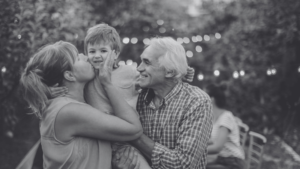Imagine you are on a ship at sea when, suddenly, piercing sirens jolt you. A blaring voice over the loud speaker announces there is an emergency. Directions ensue: Passengers must quickly reach the deck for a life-saving exit strategy. Lifeboats are available to save you from the demise of the damaged vessel. Would you want a lifeboat?
Our Internal Lifeboats
Each of us has a lifeboat between our ears. The human brain is a three-pound, magnificent work of art that directs everything we say, think and do. In all its grandeur the brain dictates our decisions, runs relationships, and produces personal preferences.
When trained, the brain is a God-given instrument to sustain relationships, improve marriages, further friendships and create churches. Our brain is a personal lifeboat that works best with joyful relationships. This efficient little lifeboat relies on learned relational skills that enable us to respond to moment-by-moment circumstances in the best possible manner.
Nineteen Relational Brain Skills
Life Model Works has identified nineteen relational brain skills that must be learned for optimal relational, personal, emotional, spiritual and mental health. Every one of us, ideally, develops these skills by the time we reach 3 years old. When the nineteen are not fully mastered, we experience difficulties. We end up feeling empty, a shell of who we wanted to be.
Acquiring the Nineteen Skills
There is hope! The lifeboat between our ears can transform us to a confident, brilliant cruiser that sails the high relational seas with efficiency, style and grace. Young or old, we can train our brain to learn the nineteen skills. Whether we need a tune up or a makeover, there is no better time to start than today. Relational brain skills may be the best investment we can make in our lifetime.
The process of learning nineteen skills takes human interaction and time. The nineteen form a resilient identity that gracefully endures under stress, fatigue and pain. We start to see joyful character that shines and suffers well during strain and distress. Without these essential skills, something is missing in our lives.
Practicing Nineteen Skills
I met a man in an airport who was missing something. The problem for him was he lacked the answer. His escalating emotions were spilling out, and spreading toxic material to innocent bystanders. I share this story in the new book, Joy Starts Here: The Transformation Zone:
We were standing in line to board an airplane when the announcement was made that our plane was full. Because this was the last flight, I knew we faced an overnight stay. One passenger in line suddenly lost it. In a rage he threw his bags and spewed profanities. His raging voice echoed in the terminal. Passengers scattered. This guy was no longer in relational mode. As I made my way over to the ticket desk, he walked around the terminal screaming at anyone in uniform. I could see his red face and his intense emotions were scaring people. By this time his eyes were bulging and he was sweating profusely. As he neared the ticket desk, I felt compelled to reach out to him. I knew this man was drowning. He needed some serious help returning to joy so I took a deep breath and walked up to him. For a moment I wondered if he would knock me out.
“You are really having a bad day, aren’t you?” I asked affirmingly. “You are *%#$ right I am having a bad day!” he fired back. We locked eyes for a few moments then I said, “Well, I am a pastor, a follower of Jesus and I would be honored if I could pray with you.” I was pleasantly relieved when he muttered, “Ok, yeah, sure.” Standing in the middle of the terminal we bowed our heads. I put my hand on his shoulder, we took a moment of quiet (skill two). Then, I invited Immanuel to share our distress and bring some vision (skill thirteen).
I noticed tears running down his face. “You see,” he explained, “I have been traveling for medical help because I was recently diagnosed with serious cancer. This flight cancellation takes away my precious, limited time with my wife and daughters.” For a few moments we shared sadness then he said, “Wait! I have to do something.” He retraced his steps and apologized to every single airline employee he offended. After several minutes he returned. “I have been feeling like I need to get right with God,” he told me. “I wonder if this whole ordeal is God speaking?” A sparkle of joy appeared in his eyes as his face muscles relaxed. The next morning I saw him boarding the flight with a smile and a brand new Bible under his arm.
Because of my learned relational skills I stayed anchored long enough to toss him a life preserver. He needed a lifeboat in the form of a trained brain who could stay connected with him even in the midst of intense emotions. His right hemisphere required another person, a mirror, to show him the way to Skill 2, Simple Quiet. All of us are taking in water. Some are used to the water while others are ready for change.
Which one are you?
Maintaining Joy In Our Lives
Joy is fundamental to the formation and expression of our character. Our character is molded through ongoing interactions with people who either have or lack the nineteen relational skills. Joy is the foundation to learn new brain skills that transform our relationships.
Those of us who have the nineteen skills do not realize or remember how we gained the skills. Simply, the skills are similar to driving a car. We don’t think about it. For this reason it is easy to misunderstand why everyone else is not the same. We may even assume people lack motivation, faith and will power.
Learning the Nineteen Skills
Thanks to brain plasticity, experience reorganizes neural pathways in the brain. Experience, particularly joyful interactions with people who have the skills, propel us in mastering skills. For too long nineteen skills have flown under the radar. There was no language, much less a training format to learn new skills.
At Life Model Works we now have the language and training structure. All we need is you.
Not sure where to start? Read Joy Starts Here! or attend one of our Joy Starts Here! events in a city near you.









